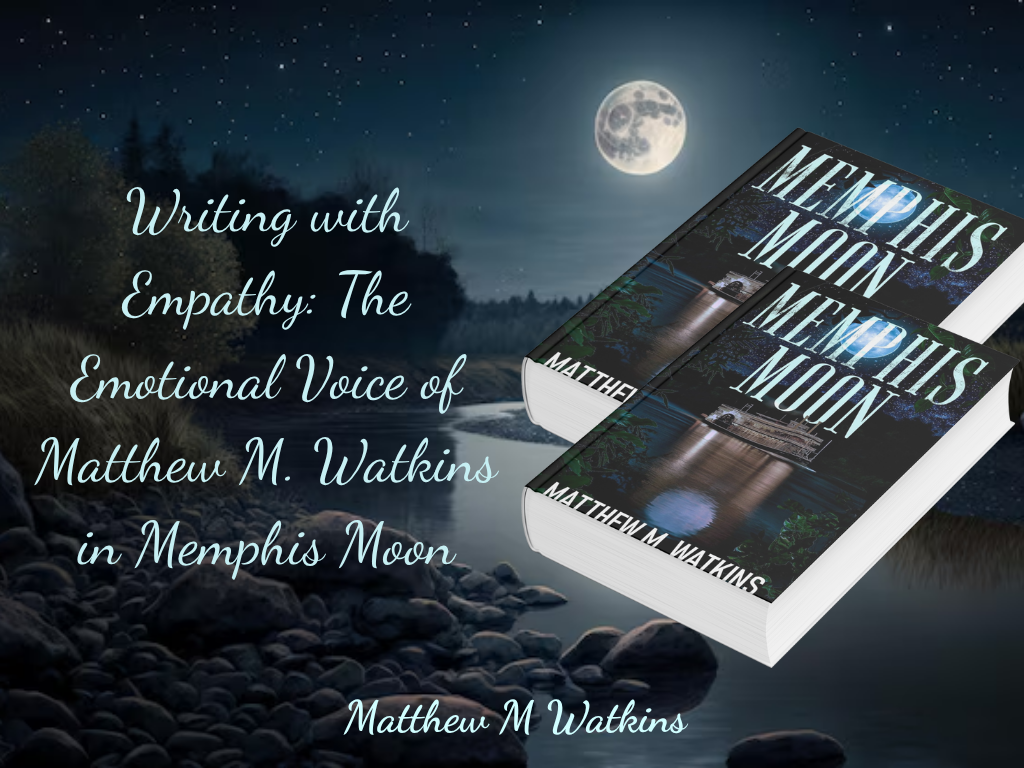If there’s one word that defines Matthew M. Watkins work, it’s empathy, not as a theme, not as a message, but as a method. Memphis Moon isn’t written about compassion; it’s written through compassion. Every page hums with the author’s quiet insistence that to understand the past, you must first feel it.
Watkins doesn’t approach storytelling as an act of invention; he approaches it as an act of listening. His writing voice carries that stillness, the sense that before he speaks for his characters, he lets them breathe. Whether he’s giving life to Caleb Dawkins, rebuilding his father’s gristmill after the war, or to Ginnie Moon, penning her thoughts in a secret diary, Watkins writes from within their emotional world, not above it. That closeness, that empathy, is what makes Memphis Moon resonate across time.
In both his press release and featured article, Watkins describes the writing of Memphis Moon as a deeply personal process. He didn’t want to lecture about history or dramatize tragedy. He wanted to understand it, to enter the hearts of people who lived through a world that was breaking apart and see how they found meaning again. The Civil War, for him, is not a stage for conflict but a testing ground for compassion. He uses the backdrop of loss and division to explore how people cling to grace when everything else falls away.
That’s the root of his emotional philosophy: empathy as moral imagination. Watkins doesn’t just tell readers what his characters feel; he makes space for them to feel it too. He trusts emotion as the most authentic way of knowing. Facts can describe a century, but only empathy can make it live again.
His prose reflects that belief. It’s tender but never sentimental, restrained but never distant. He writes with a kind of moral quiet, a refusal to impose judgment or pity. Instead, Watkins observes. He watches his characters struggle and heal in their own rhythm. He allows Caleb’s grief to unfold in silence, Ginnie’s courage to flicker and falter before it steadies, and Lottie’s faith to persist through fatigue and doubt. This patience, the refusal to rush emotion, is what gives Memphis Moon its uncommon depth.
In the world Watkins builds, empathy isn’t a soft virtue; it’s an act of strength. He isn’t interested in perfect heroes. He’s interested in people learning to live with imperfection. In this way, Memphis Moon becomes more than historical fiction; it becomes a study in emotional truth. Watkins uses history as the soil, but what he grows in it is empathy, the kind that reaches across generations and speaks directly to the present.
One of the most profound moments in the novel, when the modern writer uncovers Ginnie’s diary, encapsulates this philosophy perfectly. The diary isn’t just a plot connection; it’s a bridge of feeling. Through it, the modern world meets the old not through information, but through emotion. The words on those aged pages carry sorrow, love, and resilience that feel startlingly current. Watkins’s voice makes that connection seamless, as though empathy itself is timeless.
In crafting that emotional bridge, Watkins never tells readers how to feel. He invites them. His writing is immersive, but never manipulative. He trusts that the human heart, once given space to listen, will recognize itself in others, even across centuries. That trust defines his art.
Watkins has said that the goal of Memphis Moon was not to recreate history, but to “redeem feeling.” In a time when the past is often flattened into dates and battles, he restores its pulse. Through empathy, he revives what textbooks can’t capture: the tremor of a hand writing a letter before battle, the silence of a town after loss, the resilience of those who decide to begin again.
That’s what makes his writing voice so distinct. It isn’t loud, or showy, or self-conscious. It’s compassionate, a steady light rather than a spotlight. It guides readers, but never dictates their experience. In doing so, Watkins achieves something rare: he allows empathy itself to become the narrative engine.
By the end of Memphis Moon, readers don’t just understand the world of Caleb and Ginnie; they inhabit it. They carry their emotions as if they were their own. That’s the ultimate measure of Watkins’s philosophy: when the story ends, the feeling doesn’t. His empathy lingers, not as sentiment, but as memory.
And that, perhaps, is his greatest gift as a writer. Watkins doesn’t tell us what to believe. He helps us remember what it means to care.

